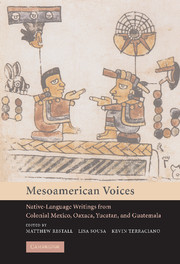Book contents
- Frontmatter
- Contents
- List of Documents and Images
- Preface and Acknowledgments
- Colonial Mesoamerica
- PART ONE
- PART TWO
- 3 Views of the Conquest
- 4 Political Life
- 5 Household and Land
- 6 Society and Gender
- 7 Crime and Punishment
- 8 Religious Life
- 9 Rhetoric and Moral Philosophy
- Glossary
- References and Readings
- Index
9 - Rhetoric and Moral Philosophy
Published online by Cambridge University Press: 05 October 2014
- Frontmatter
- Contents
- List of Documents and Images
- Preface and Acknowledgments
- Colonial Mesoamerica
- PART ONE
- PART TWO
- 3 Views of the Conquest
- 4 Political Life
- 5 Household and Land
- 6 Society and Gender
- 7 Crime and Punishment
- 8 Religious Life
- 9 Rhetoric and Moral Philosophy
- Glossary
- References and Readings
- Index
Summary
The documents in this chapter shed light on Mesoamerican conceptions of morally appropriate behavior – codes of conduct ranging from royal demeanor to the fidelity of a married man or woman to the behavior of children. Many of the speeches that were recorded in the early colonial period accompanied life-cycle rituals, such as birth, coming-of-age, and marriage. What is most noticeable about this discourse on proper behavior is the honorific, high language that it employs. Many of the reverential expressions and words were probably more archaic, elite forms that reinforced distinctions between nobles and commoners. But it was more a manner of speaking properly and respectfully than a separate language or vocabulary that was unintelligible to commoners.
The most famous high speech is the Nahuatl huehuehtlahtolli or “old speech,” preserved in sixteenth-century texts such as the Bancroft Dialogues or in Book VI of the Florentine Codex. As shown here, Nahuatl reverential speech contained countless metaphorical expressions, many of which combined two separate nouns or verbs imparting a particular meaning when joined as a pair. For example: cuitlapilli, “tail,” and atlapalli, “wing,” indicated a “commoner.” To be in “someone's lapfolds,” cuexanco, and “someone's backpack,” mamalhuazco, meant “to be the responsibility of, or to be governed by, someone.” Some expressions are simply polite ways of saying something, such as the term tlalticpaciaoiuh, or “earthly pleasure,” for sexual intercourse. The speeches rely on repetition and a fair share of humility. Many morals invoke the lore of revered ancestors and deities.
- Type
- Chapter
- Information
- Mesoamerican VoicesNative Language Writings from Colonial Mexico, Yucatan, and Guatemala, pp. 202 - 226Publisher: Cambridge University PressPrint publication year: 2005



